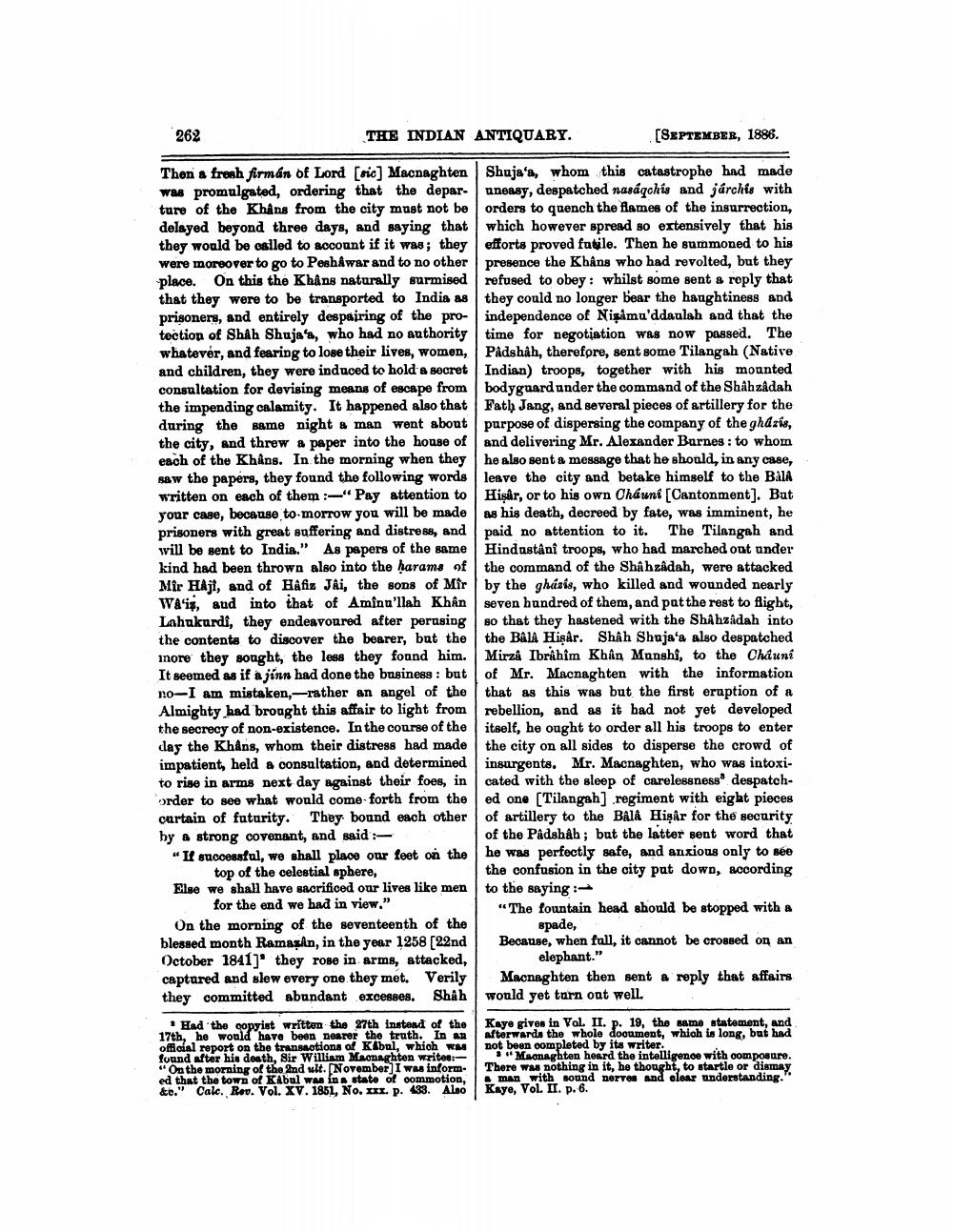________________
262
THE INDIAN ANTIQUARY.
[SEPTEMBER, 1886.
Shuja's, whom this catastrophe had made uneasy, despatched naságchis and jarchis with orders to quench the flames of the insurrection, which however spread so extensively that his efforts proved futile. Then he summoned to his presence the Khâns who had revolted, but they refused to obey: whilst some sent a reply that they could no longer bear the haughtiness and independence of Nizamu'ddaulah and that the time for negotiation was now passed. The Pâdshah, therefore, sent some Tilangah (Native Indian) troops, together with his mounted bodyguard under the command of the Shahzadah Fath Jang, and several pieces of artillery for the purpose of dispersing the company of the ghazis, and delivering Mr. Alexander Burnes: to whom he also sent a message that he should, in any case, leave the city and betake himself to the Bala Hisar, or to his own Cháuni [Cantonment]. But as his death, decreed by fate, was imminent, he paid no attention to it. The Tilangah and Hindustani troops, who had marched ont under the command of the Shahzadah, were attacked by the ghasis, who killed and wounded nearly seven hundred of them, and put the rest to flight, so that they hastened with the Shahzâdah into the Bâlâ Hisar. Shah Shuja'a also despatched Mirza Ibrahim Khân Munshi, to the Chauni of Mr. Macnaghten with the information that as this was but the first eruption of a rebellion, and as it had not yet developed itself, he ought to order all his troops to enter the city on all sides to disperse the crowd of insurgents. Mr. Macnaghten, who was intoxicated with the sleep of carelessness" despatched one [Tilangah] regiment with eight pieces of artillery to the Bâlâ Hisar for the security of the Pâdshah; but the latter sent word that
"If successful, we shall place our feet on the he was perfectly safe, and anxious only to see the confusion in the city put down, according
top of the celestial sphere,
Else we shall have sacrificed our lives like men to the saying:→→
for the end we had in view."
Then a fresh firmán of Lord [sic] Macnaghten was promulgated, ordering that the departure of the Khâns from the city must not be delayed beyond three days, and saying that they would be called to account if it was; they were moreover to go to Peshawar and to no other place. On this the Khans naturally surmised that they were to be transported to India as prisoners, and entirely despairing of the protection of Shah Shuja'a, who had no authority whatever, and fearing to lose their lives, women, and children, they were induced to hold a secret consultation for devising means of escape from the impending calamity. It happened also that during the same night a man went about the city, and threw a paper into the house of each of the Khâns. In the morning when they saw the papers, they found the following words written on each of them :-"Pay attention to your case, because to-morrow you will be made prisoners with great suffering and distress, and will be sent to India." As papers of the same kind had been thrown also into the harams of Mir Haji, and of Hafiz Jai, the sons of Mir Wai, and into that of Aminu'llah Khân Lahukardi, they endeavoured after perusing the contents to discover the bearer, but the more they sought, the less they found him. It seemed as if a jinn had done the business: but no-I am mistaken,-rather an angel of the Almighty had brought this affair to light from the secrecy of non-existence. In the course of the day the Khans, whom their distress had made impatient, held a consultation, and determined to rise in arms next day against their foes, in order to see what would come forth from the curtain of futurity. They bound each other by a strong covenant, and said :
On the morning of the seventeenth of the blessed month Ramazan, in the year 1258 [22nd October 1841] they rose in arms, attacked, captured and slew every one they met. Verily they committed abundant excesses. Shah
Had the copyist written the 27th instead of the 17th, he would have been nearer the truth. In an official report on the transactions of Kabul, which was found after his death, Sir William Macnaghten writes:"On the morning of the 2nd ult. [November] I was informed that the town of Kabul was in a state of commotion, &c." Calc. Rev. Vol. XV. 1851, No. xxx. p. 433. Also
"The fountain head should be stopped with a spade,
Because, when full, it cannot be crossed on an elephant."
Macnaghten then sent a reply that affairs would yet turn out well.
Kaye gives in Vol. II. p. 19, the same statement, and afterwards the whole document, which is long, but had not been completed by its writer.
Macnaghten heard the intelligence with composure. There was nothing in it, he thought, to startle or dismay a man with sound nerves and clear understanding." Kaye, Vol. II. p. 6.




